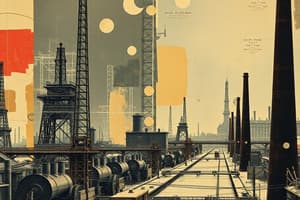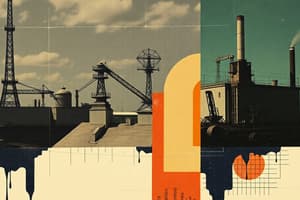Podcast
Questions and Answers
What role did engineering play in the industrial revolution?
What role did engineering play in the industrial revolution?
- Promoting globalization through improved communication
- Creating job opportunities for rural populations
- Innovating stronger materials for construction of machines (correct)
- Developing new agricultural techniques
How did the industrial revolution impact global trade?
How did the industrial revolution impact global trade?
- Caused a decline in the export of goods
- Led to the isolation of countries from global markets
- Reduced international commerce due to local production
- Significantly increased international trade and commerce (correct)
What social changes were brought about by the industrial revolution?
What social changes were brought about by the industrial revolution?
- Decrease in urban population due to rural migration
- Decline in the growth of cities and communities
- Development of new urban communities and working-class areas (correct)
- Increase in rural employment opportunities
Why did European powers colonize Africa and Asia during the industrial revolution?
Why did European powers colonize Africa and Asia during the industrial revolution?
In what way did precision engineering contribute to the industrial revolution?
In what way did precision engineering contribute to the industrial revolution?
What was the significance of agricultural improvements during the early stages of the industrial revolution?
What was the significance of agricultural improvements during the early stages of the industrial revolution?
Which technological innovations played a key role in the agricultural changes of the industrial revolution?
Which technological innovations played a key role in the agricultural changes of the industrial revolution?
What was one of the first sectors to be transformed by the industrial revolution?
What was one of the first sectors to be transformed by the industrial revolution?
How did the invention of spinning jenny, water frame, and power loom impact textile production during the industrial revolution?
How did the invention of spinning jenny, water frame, and power loom impact textile production during the industrial revolution?
What new transportation technologies were critical during the industrial revolution?
What new transportation technologies were critical during the industrial revolution?
Flashcards are hidden until you start studying
Study Notes
History of Industrial Revolution
The history of the industrial revolution is an essential part of understanding modern economic growth and technological advancements. This period began around the late 18th century and lasted until roughly the mid-19th century. It was marked by significant changes in agriculture, manufacturing, mining, transport, and engineering. Here's a brief overview of this transformational era:
Agricultural Changes
In the early stages of the industrial revolution, agricultural improvements played a crucial role. These enhancements increased the efficiency and productivity of farming, which led to population growth and provided a more substantial labor force for industrialization. Technological advancements such as the seed drill, the rotary plow, and the threshing machine were key innovations that facilitated these changes.
Textile Industry
The textile industry was one of the first sectors to be transformed by the industrial revolution. It underwent rapid technological advancements that led to the mechanization of textile production. The invention of the spinning jenny, water frame, and power loom significantly increased the speed and efficiency of textile production.
Transportation
The development of new transportation technologies was another critical aspect of the industrial revolution. Canal and river transport became more efficient, while the steam-powered railways allowed for faster and more reliable transportation of goods. These advancements facilitated the movement of raw materials and finished products, enabling the growth of industries and the expansion of global trade.
Engineering
Engineering played a significant role in the industrial revolution. Innovations in metallurgy led to the development of stronger materials, which in turn enabled the construction of larger and more complex machines. Furthermore, the development of precision engineering and mass production techniques allowed for the efficient production of high-quality goods.
Social Changes
The industrial revolution led to significant social changes. The growth of industries created new employment opportunities, attracting large numbers of people from rural areas to urban centers. This led to the development of new urban communities, which in turn led to the growth of cities and the emergence of working-class communities.
Global Impact
The industrial revolution had a profound impact on the world. It led to the rise of global trade and the growth of international commerce. It also facilitated the colonization of Africa and Asia by European powers, as they sought new markets and resources.
The industrial revolution marked a turning point in human history. Its legacy continues to shape our world today, with many of its innovations still influencing technology, economics, and society.
Studying That Suits You
Use AI to generate personalized quizzes and flashcards to suit your learning preferences.




